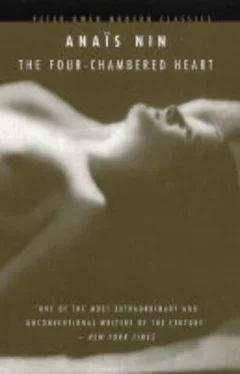Anaïs Nin - The Four-Chambered Heart
Здесь есть возможность читать онлайн «Anaïs Nin - The Four-Chambered Heart» весь текст электронной книги совершенно бесплатно (целиком полную версию без сокращений). В некоторых случаях можно слушать аудио, скачать через торрент в формате fb2 и присутствует краткое содержание. Год выпуска: 2004, ISBN: 2004, Издательство: Peter Owen Limited, Жанр: Классическая проза, Эротические любовные романы, на английском языке. Описание произведения, (предисловие) а так же отзывы посетителей доступны на портале библиотеки ЛибКат.
- Название:The Four-Chambered Heart
- Автор:
- Издательство:Peter Owen Limited
- Жанр:
- Год:2004
- ISBN:9780720611557
- Рейтинг книги:3 / 5. Голосов: 1
-
Избранное:Добавить в избранное
- Отзывы:
-
Ваша оценка:
- 60
- 1
- 2
- 3
- 4
- 5
The Four-Chambered Heart: краткое содержание, описание и аннотация
Предлагаем к чтению аннотацию, описание, краткое содержание или предисловие (зависит от того, что написал сам автор книги «The Four-Chambered Heart»). Если вы не нашли необходимую информацию о книге — напишите в комментариях, мы постараемся отыскать её.
The Four-Chambered Heart — читать онлайн бесплатно полную книгу (весь текст) целиком
Ниже представлен текст книги, разбитый по страницам. Система сохранения места последней прочитанной страницы, позволяет с удобством читать онлайн бесплатно книгу «The Four-Chambered Heart», без необходимости каждый раз заново искать на чём Вы остановились. Поставьте закладку, и сможете в любой момент перейти на страницу, на которой закончили чтение.
Интервал:
Закладка:
“To me, it is the world of history which appears mad, treacherous and full of contradictions,” said Djuna.
“In Guatemala,” said Rango, with an ironic twist of his lips which Djuna disliked, “they placed madmen by the side of the river, and that cured them. If your madmen don’t get cured, we’ll make a hole in the floor and sink them.”
“I may sink with them, you know.”
Walking along the quay, they saw a hobo sitting under a tree, a hobo with a Scotch cap, a plaid, and a crooked pipe.
Rango adopted his best imitation of a Scotch accent and said: “Weel, and where d’ya come from, ma good friend?”
But the hobo looked up bewildered and said in pure Montmartre French: “Mon Dieu, I’m no foreigner, sir. What makes you think I am?”
“The cap and the blanket,” said Rango.
“Oh, that, sir, it’s just that I’m always digging in the garbage can of the Opera Comique, and I found this rig. It was the only one I could wear, you understand, the others were a little too fancy, and most of them pretty indecent, I must say.”
Then he took a faded gray sporran out of his pocket: “Could you tell me what this is for?”
Rango laughed: “That’s a wig. The use of the skirt has caused premature baldness of an unusual kind in Scotland. Hold on to it, it might come useful one day…”
Sabina walked with her feet flat on the ground, which gave to her heavy body the poise of Biblical water carriers.
Djuna saw her and Rango as composed of the same elements, and felt that perhaps they would love each other. She imagined a parting scene with Rango, surrendering his black hair to hers heavy and straight, his burnt sienna skin to her incandescent gold one, his rough dry hands to her strong peasant ones, his laughter to hers, his Indian slyness to her Semitic labyrinthian mind. They will recognize each other’s climate of fever and chaos, and embrace each other.
Djuna was amazed to see her predictions unfulfilled. Rango fled from Sabina’s intensity and violence. They met like two armed warriors, and the part of Rango which longed to be yielded to, who longed for warmth, found in Sabina an unyielding armor. She yielded only at the last moment, merely to achieve a sensual embrace, and immediately after was poised for battle again. No aperture for tenderness to lodge itself, for his secret timidity to flow into, as it flew into Djuna’s breast. Not a woman one could nestle into.
They sought grounds for a duel. Rango hated her presence about Djuna, and would have liked to drive her away from the barge.
Once sitting in a restaurant together, with Djuna and two other friends, they decided to see which one could eat the most red chilies.
They ate the red chilies with ostentatious insolence, watching each other. At first mixed with rice and vegetables, then with the salad, and finally by themselves.
Both might have died of the contest, for neither one would yield. Each little red chili like a concentrate of fire which burned them both.
Now and then they opened their mouths wide and breathed quickly in and out, as if to cool their insides.
As in the old myths, they sat like fire eaters partaking of a fire banquet. Tears came to Sabina’s intense dark eyes. A sepia flush came to Rango’s laughing cheeks, but neither would yield, though they might scar their entrails.
Fortunately the restaurant was closing, and the waiters maliciously washed the floor under their feet with ammonia, piled chairs on the table, and finally put an end to the marathon by turning out the lights.
Not one but many Djunas descended the staircase of the barge, one layer formed by the parents, the childhood, another molded by her profession and her friends, still another born of history, geology, climate, race, economics, and all the backgrounds and backdrops, the sky and nature of the earth, the pure sources of birth, the influence of a tree, a word dropped carelessly, an image seen, and all the corrupted sources: books, art, dogmas, tainted friendships, and all the places where a human being is wounded, defeated, crippled, and which fester…
People add up their physical mishaps, the stubbed toes, the cut finger, the burn scar, the fever, the cancer, the microbe, the infection, the wounds and broken bones. They never add up the accumulated bruises and scars of the inner lining, forming a complete universe of reactions, a reflected world through which no event could take place without being subjected to a personal and private interpretation, through this kaleidoscope of memory, through the peculiar formation of the psyche’s sensitive photographic plates, to this assemblage of emotional chemicals through which every word, every event, every experience is filtered, digested, deformed, before it is projected again upon people and relationships.
The movement of the many layers of the self-described by Duchamp’s “Nude Descending a Staircase,” the multiple selves grown in various proportions, not singly, not evenly developed, not moving in one direction, but composed of multiple juxtapositions revealing endless spirals of character as the earth revealed its strata, an infinite constellation of feelings expanding as mysteriously as space and light in the realm of the planets.
Man turned his telescope outward and far, not seeing character emerging at the opposite end of the telescope by subtle accumulations, fragments, accretions, and encrustations.
Woman turned her telescope to the near, and the warm.
Djuna felt at this moment a crisis, a mutation, a need to leap from the self-born of her relationship to Rango and Zora, a need to resuscitate in another form. She was unable to follow Rango in his faith, unable either to live in the dream in peace, or to sail the barge accurately through a stormy Seine.
She found herself defending Sabina against Rango’s ruthless mockery. She defended Sabina’s philosophy of the many loves against the One.
(Rango, your anger should not be directed against Sabina. Sabina is only behaving as all women do in their dreams, at night. I feel responsible for her acts, because when we walk together and I listen to her telling me about her adventures, a part of me is not listening to her telling me a story but recognizing scenes familiar to a secret part of myself. I recognize scenes I have dreamed and which therefore I have committed. What is dreamed is committed. In my dreams I have been Sabina. I have escaped from your tormenting love, caressed all the interchangeable lovers of the world. Sabina cannot be made alone responsible for acting the dreams of many women, just because the others sit back and participate with a secret part of their selves. Through secret and small vibrations of the flesh they admit being silent accomplices to Sabina’s acts. At night we have all tossed with fever and desire for strangers. During the day we deride Sabina, and revile her. You’re angry at Sabina because she lives out all her wishes overtly as you have done. To love Sabina’s fever, Sabina’s impatience, Sabina’s evasion of traps in the games of love, was being Sabina. To be only at night what Sabina dared to be during the day, to bear the responsibility for one’s secret dream of escape from the torments of one love into many loves.)
Sabina sat astride a chair, flinging her hair back with her hands and laughing.
She always gave at this moment the illusion that she was going to confess. She excelled in this preparation for unveiling, this setting of a mood for intimate revelations. She excelled equally in evasion. When she wished it, her life was like a blackboard on which she wrote swiftly and then erased almost before anyone could read what she had written. Her words then did not seem like words but like smoke issuing from her mouth and nostrils, a heavy smoke screen against detection. But at other times, if she felt secure from judgment, then she opened a story of an incident with direct, stabbing thoroughness…
Читать дальшеИнтервал:
Закладка:
Похожие книги на «The Four-Chambered Heart»
Представляем Вашему вниманию похожие книги на «The Four-Chambered Heart» списком для выбора. Мы отобрали схожую по названию и смыслу литературу в надежде предоставить читателям больше вариантов отыскать новые, интересные, ещё непрочитанные произведения.
Обсуждение, отзывы о книге «The Four-Chambered Heart» и просто собственные мнения читателей. Оставьте ваши комментарии, напишите, что Вы думаете о произведении, его смысле или главных героях. Укажите что конкретно понравилось, а что нет, и почему Вы так считаете.












